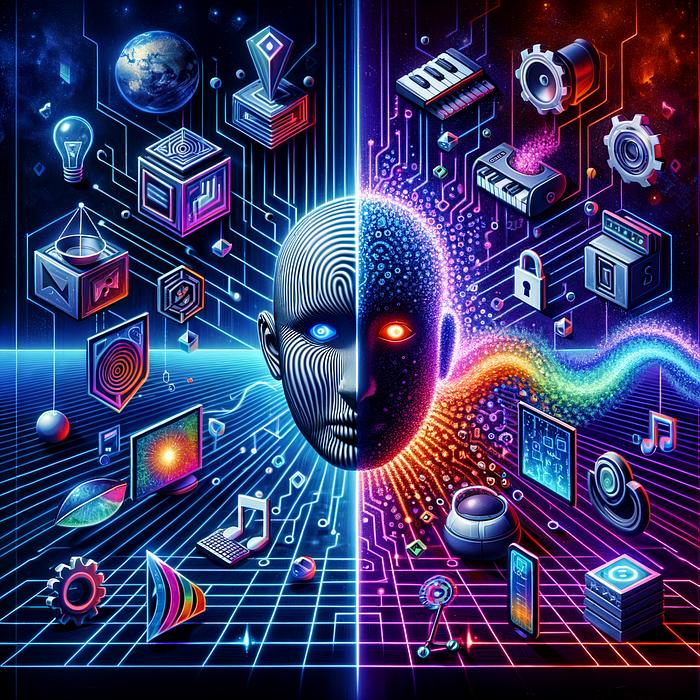Navigating the Intersection of AI, Creativity, and Ethics
Written on
Chapter 1: Introduction
In today's rapidly changing technological landscape, artificial intelligence (AI) stands out as a transformative force, reshaping various industries, particularly in entertainment and gaming. The journey of AI is characterized by remarkable innovations and intricate ethical challenges. One prominent issue is the emergence of deepfakes, raising significant ethical questions as platforms like YouTube struggle with AI-generated content that can obscure the line between reality and fabrication. Despite implementing policies requiring the labeling of AI-produced videos, the ongoing challenge of identifying and regulating deepfake content underscores the delicate balance between technological advancement and ethical responsibility.

AI's capabilities extend beyond mere content generation; it enhances video quality, generates music, and facilitates real-time voice communication, promising a future where technology complements human creativity. Innovations such as Stability.ai’s video stabilization technology and Suno’s MuseNet chatbot for music composition illustrate this potential. These advancements not only enrich our artistic experiences but also serve as catalysts for creative exploration and collaboration.
However, as we embrace these capabilities, it is essential to critically assess the broader implications of integrating AI into various domains. Concerns about employment, privacy, and social norms necessitate a nuanced understanding of AI's potential benefits and pitfalls. This narrative invites us to navigate the ethical and practical challenges posed by AI, from promoting transparency in scientific publishing to addressing job displacement and inherent biases within AI systems.
Chapter 2: AI in Video Games & Entertainment
The advent of AI has significantly impacted the realms of video games and entertainment, paving the way for diverse applications. For instance, platforms like YouTube are grappling with the rise of deepfakes — a phenomenon wherein AI-generated videos can convincingly mimic reality. In response, YouTube has mandated that creators label AI-generated content, although critics question the policy's effectiveness. The sophistication of AI makes it challenging to detect and eliminate deepfake content, revealing one of the many ethical dilemmas posed by this technology.
In addition to challenges, AI brings numerous benefits, such as Stability.ai's innovative video stabilization technology, Stable Video 3D. This deep learning solution enhances video quality by differentiating between intentional and unintentional camera movements, resulting in smoother footage that can significantly improve user experience in various contexts, including event coverage and security surveillance.
AI’s influence also extends to music generation. Suno’s MuseNet exemplifies how AI can function as a creative partner, offering musicians inspiration and collaborative opportunities. This tool exemplifies a future where AI enhances rather than replaces human creativity, encouraging artistic exploration.
Furthermore, AI-driven tools like Soundry AI and Real-time voice chat with AI demonstrate the technology's potential to democratize creativity and communication. Soundry AI, for instance, focuses on making high-quality music samples accessible to novices, while tools for real-time voice communication enhance team collaboration and customer service experiences.
Yet, the promise of AI must be tempered with caution. As we explore these advancements, it is imperative to engage in discussions about safeguarding against misinformation, preserving authenticity, and protecting user privacy. To navigate this evolving landscape responsibly, we must foster collaboration, encourage open dialogues about AI ethics, and implement regulatory measures that balance innovation with accountability.
Chapter 3: Debates & Discussions on AI
As AI technology continues to evolve, it generates both excitement and apprehension. While sectors such as healthcare and finance benefit from AI applications, challenges related to readiness, bias, and ethical implications persist. The potential for job displacement, particularly in traditional programming roles, raises important questions about the future of work in an AI-dominated landscape.
The recent introduction of AI-assisted tools in peer review processes exemplifies the need for careful consideration of AI's role in various fields. While these innovations can enhance efficiency and objectivity, they also raise concerns about the lack of human insight and the potential for biased outcomes. A collaborative approach that combines human expertise with AI assistance can create a more effective and equitable peer review process.
In light of these discussions, it is crucial to maintain a balanced perspective on AI's capabilities. Open conversations, interdisciplinary collaborations, and regulatory measures can help navigate the complexities of AI development, ensuring that we harness its benefits while addressing its risks.
Next Section: AI in Legislation & Regulation
Back To Top